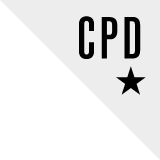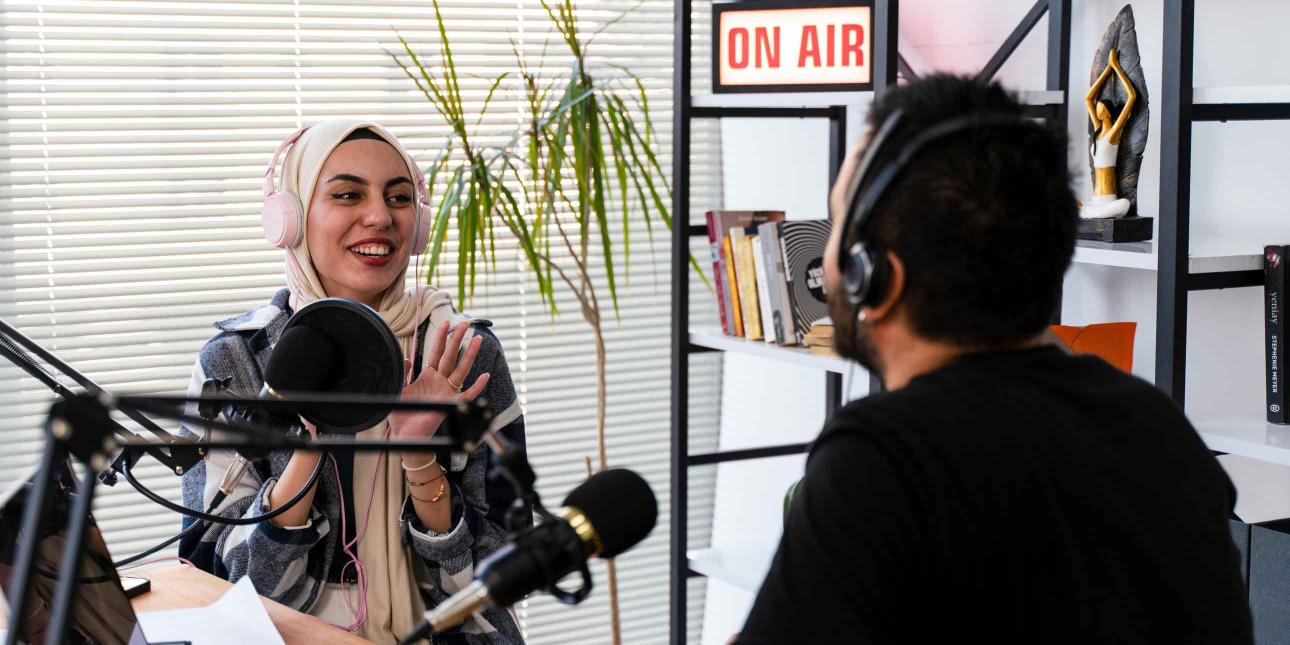Power of the podcast
Meet the PR firms using the medium to promote niche accounts, win new business and mark themselves out as thought leaders. Plus, you never know, Nicole Kidman might be listening
The moment when PR legend Tanya Rose knew her podcast would be a success wasn’t when the first 40 luminaries she asked to be guests all said ‘yes’. Or when her interview with beauty entrepreneur Trinny Woodall hit 20,000 YouTube views. Instead, it came when her mobile buzzed with a call from actor Mark Strong (pictured below), then filming Nine Perfect Strangers with Nicole Kidman.
“Tanya!” he boomed down the phone. “I want to let you know I’m sitting on a mountain with Nicole [Kidman] listening to the podcast. We think it’s brilliant! You deserve huge success!”
The founder of travel PR agency Mason Rose only launched her Travel Secrets podcast in February. Yet, despite having no prior podcasting experience, a raft of celebrities from Dominic West to Sharon Osbourne have signed up to be guests.
If the saying ‘everybody has a story to tell’ is correct, then podcasting and PRs – whose bread-and-butter is brand storytelling – seem like a natural fit. Mason Rose is one of a growing number of PR firms – see also Edelman (The TrustMakers) and Teneo’s (Insights) – using podcasting to promote their business and clients, plus demonstrate industry expertise.
The rise of PR podcasting mirrors the trend in its popularity in mainstream culture: according to a recent YouGov survey, 42% of people in the UK listen to a podcast every week; whether it’s a comedy podcast brightening up a dull commute, listening to a true crime series while doing the dishes, or getting business tips from Steven Bartlett’s Diary of a CEO while in the bath, many of us have embraced the authenticity and intimacy of podcasts like a trusted friend.
They’re no longer a solitary audio experience piped through our AirPods either: today, podcasts are also a visual format (see the BBC’s Newscast or The Traitors: Uncloaked) and a live experience: comedians James Acaster and Ed Gamble sold out the Royal Albert Hall with the tour of their Off Menu podcast; Alastair Campbell and Rory Stewart have toured the UK four times with The Rest is Politics podcast.
Meanwhile, Bill Gates, Dua Lipa, Meghan Markle, Michelle Obama, Louis Theroux, Oprah Winfrey, Julia Louis-Dreyfus and Hillary Clinton are all using podcasts to help build personal brands.
For comms professionals, though, one of podcasting’s biggest benefits is the platform can mark you – or your firm – out as thought-leaders in a specific area or industry.
“Podcasts give you a voice of authority,” says Rose. “When I launched Travel Secrets, I thought this is a good way of showing what we know.”
They can also help win new clients. “I think our podcast is attracting more hotels to Mason Rose as clients because it shows we’re digitally-savvy and well connected,” says Rose. “During a pitch, PR firms might say they know about digital or they might have access to people (celebrities) or whatever it might be, but prospective clients can find this out for themselves by simply listening to your podcast.”
Podcasting for PR
Naturally, podcasts provide a convenient, cost-effective way to promote existing clients. CIPR member Jane Hunt (pictured, below) is managing director of Lancashire-based Catapult PR and twice-winner of the CIPR’s Independent Practitioner of the Year award. While attending a training course in 2018 she had a “lightbulb moment: I could interview my clients on a podcast and it’d be a great showcase for them. It also showcases what I do as a company – something difficult to do when you’re a small agency.”
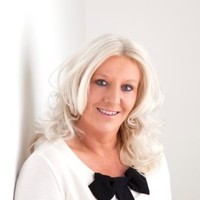 Hunt currently runs two podcasts: The Catapult PR Show (featuring corporate, insurance and financial services clients) and Poodling Around (focused on her travel/pet clients).
Hunt currently runs two podcasts: The Catapult PR Show (featuring corporate, insurance and financial services clients) and Poodling Around (focused on her travel/pet clients).
“Our clients are pleased for the exposure [from the podcast] but it also gives them something different for their marketing,” says Hunt. “They use links to the podcast in their newsletters and social media. The podcasts have helped one insurance client attract new brokers… It’s really seen their take-up soar.”
Podcasts can also act as a springboard to offer other services to clients too. “We’d really like to start creating content for hotel clients,” says Rose. “Many have their own in-house social media, but don’t know how to do digital: how many times have you seen photos of couples drinking champagne on hotel websites? We’re actually in the process of setting up a studio to create hotels’ digital assets for them – maybe even running their podcast.”
Thinking aloud
With an estimated five million podcasts globally, the medium also offers an eclectic ecosystem of niche subjects. For PR podcasters, it enables them to identify passionate new audiences for clients/products that might be difficult to place in mainstream media. Hunt once recorded a podcast on cactus-leather shoes for one of her clients and was staggered to find it’d inexplicably been downloaded many times in Austria.
"Today, there’s an audience for most things,” says producer Natalie Chisholm, who makes podcasts for corporate clients and worked on BBC Radio 5 Live’s first podcasts. “If you find a niche nobody else is doing, such as foraging mushrooms, then go for it. Your audience might be small, but these people will be more engaged and likely to share your podcast.”
This fandom means that new podcasters shouldn’t be discouraged by small listener numbers either. “Having 32 downloads might seem like a small number, but it still puts you in the top 50% of [most-listened-to] podcasts,” adds Chisholm. “If you have more than 5,000 downloads, you’re in the top 1%.”
Podcast interviews are also a great way of media training clients. Having a casual chinwag may also unearth fresh information which could be used for future campaigns.
“Clients can be bad at telling you things,” says Hunt. “But because podcast interviews are relaxed, clients occasionally let something slip which makes you think ‘You’ve never told me that! This could be something we could work on!’ We’ve built stronger rapports with clients because of these podcast interviews – even though I’ve known some of them for years. The podcasts give me a nice exploration of what they do.”
As Hunt (who started her podcast via the GarageBand app) can testify, it’s relatively inexpensive to run a podcast; anybody with a smartphone can launch one. Despite this, many PRs might balk at the idea of becoming a podcaster, because they are notoriously time-consuming to produce. It’s not just a matter of nattering away to a friendly client for half-an-hour: a professionally produced podcast could take up to three days to make.
“You need to research the subject, find guests, write a script,” says Chisholm. “It could also take four-six hours to edit. Then there’s music, graphics and more.”
For the most part, podcasts don’t make any money either. Although the sums commanded by comedian Joe Rogan (who recently renewed his Spotify deal for an estimated $250m/£199m) or the SmartLess podcast (actors Jason Bateman, Sean Hayes and Will Arnett) which signed a $100m/£79m deal with Sirius XM can be eye-watering, the average PR may find it difficult to monetise via the standard model of programmatic advertising and sponsorship deals.
Measuring success
It’s early days for Travel Secrets but Rose believes the podcast’s power as a marketing tool transcends any sponsorship revenue it might rake in.
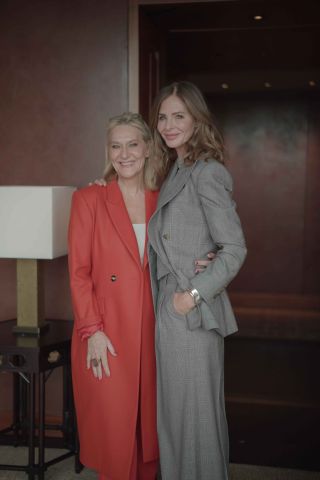
“PR has always been tenuous on ROI,” she says. “The old way used to be that the PR value is X times the value of a page of advertising. But digitally, things work differently.”
Then there’s promoting the podcast. Travel Secrets films its podcasts and uploads them to YouTube, as well as asking guests to reshare and collaborate on social posts as part of its strategy. “It helps for social purposes, which is how you promote it” says Rose.
Having a large social media following can help, but it’s not essential, because clients, journalists and podcast guests can do the work on your behalf. Once she finishes editing her podcasts, Hunt splices snippets of audio into an audiogram which clients can share on their social feeds. She also puts links to her podcasts in press releases, which “can be beneficial for helping journalists understand the subject more”.
Meanwhile, Travel Secret’s podcast guests often stay at Mason Rose’s luxury hotel clients, which include the Peninsula in Hong Kong and the Gstaad Palace. “It’s a really good marriage,” says Rose. “The hotels we represent at Mason Rose want celebrities [and are delighted] when these celebrities do social media during their visit or talk about their travel experience on the podcast.”
For the average PR, producing your own podcast may seem daunting. But as Rose points out, the personal rewards are many.
“Don’t let fear paralyse you,” she says. “Of course, your first podcast isn’t going to be great. But by the hundredth, it’ll be amazing. If you’ve got a passion and you love speaking with people, then go for it. I didn’t know the joy that podcasting would bring to my life. The fact I’m able to talk about the things I love – i.e. travel – with interesting people has brought a real sparkle back.”
Get tips and advice on creating corporate podcasts with CIPR member Sandie Gustus in this member-exclusive webinar.
How to launch your first podcast
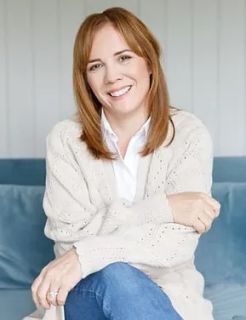 Podcast producer Natalie Chisholm shares her tips
Podcast producer Natalie Chisholm shares her tips
Figure out who your audience and subject matter will be…
First, consider your audience. Who are they? What do they do? What’s their age? Sorting out your theme and an audience is half the battle. It doesn't matter what fancy software you use, but if your podcast isn’t interesting to anybody, nobody will listen, and it won’t be successful.
The shorter, the better
Many people think they can switch on a microphone and talk. There are few people who can do that and make it sound interesting. So, start small: 15-20 minutes is good for starters, and much better than somebody waffling on for an hour. Fifteen minutes is roughly the average listening span for most people anyway.
Equipment and software
Although you can record podcasts using just a smartphone and Zoom, if you want better quality and are on a budget, consider using:
- A good USB mic. Røde do some great microphones that you can just plug-in-and-go from around £110.
- Cloud-based software such as Riverside, Zencastr and Audacity, which may offer free accounts.
Some confidence tips
Practice your podcast beforehand. Before recording the podcast, drink some water, do some stretches and take some lovely, deep breaths. It sounds simple, but it really works. Then, when recording your podcast, put a smile on your face! Believe it or not, you can hear a smile. And remember, the beauty of non-live podcasts is that if you flop or fluff it, you can edit it out and start again!
Ditch the script
It’s okay to have a script but try to put it down and have faith in your expertise. Listeners can easily detect when you’re reading from one.
Don’t forget teaser clips
An ‘intro’ is where you welcome people to your podcast and tell them what you are doing (“This is who we’ve got on, then, boom! More of that in a moment, but first…”). You also need to have an intro (“If you really enjoyed this, then next time, we’ll be talking to ABC. Please review us or share us etc”).
Listen to your podcasts afterwards
Yes, your voice really does sound like that in real life! But the more you listen to your voice, the more you get used to it. It will also help you learn about intonation, for more effectiveness.
Christian Koch is an award-winning journalist and editor who has written for the Sunday Times, Guardian, Evening Standard, Metro, Director, Cosmopolitan, ShortList and Stylist.
.png_346b001a7105948b895436c029138788.png)
.png_0f7278855842d9d4461b97b1ec506a3a.png)

